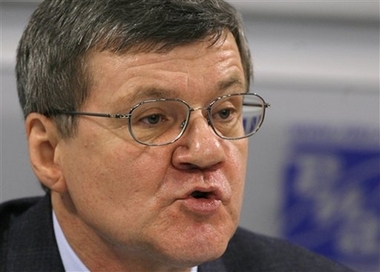Russia won't OK extradition in spy case
(AP)Updated: 2006-12-06 14:41
MOSCOW - The top prosecutor said Tuesday that Moscow will not extradite possible Russian suspects to Britain in the poisoning of the former KGB agent Alexander Litvinenko and warned that British detectives would not be allowed to carry out interrogations in Russia.
 Russia's Prosecutor General Yuri Chaika speaks at a news conference in Moscow on Tuesday, Dec. 5, 2005. [AP]  |
Prosecutor General Yuri Chaika said that under Russian law, a Russian citizen who is accused of committing a crime abroad must face trial at home.
"If they want to arrest citizens of the Russian Federation, it would be impossible because of the Russian Constitution," he told reporters.
Litvinenko, 43, died Nov. 23 in London, and toxicologists found the radioactive isotope polonium-210 in his body. On his deathbed, Litvinenko blamed President Vladimir Putin for the poisoning. The Kremlin has vehemently denied the accusations.
Putin met Tuesday with Italian Foreign Minister Massimo D'Alema, who had pledged to press Moscow about Litvinenko's poisoning, but neither man mentioned the case in their public remarks.
Chaika said his office would fully cooperate with a team of Scotland Yard investigators who arrived in Moscow on Monday to collect information on Litvinenko's death.
However, he said that all figures in the case would be questioned by Russian prosecutors in the presence of the visiting British officers.
"It is we who are doing all the interrogating. They only
attend that, it cannot be otherwise" in Russia, Chaika said.
| 1 | 2 |  |
|
||
|
||
|
|